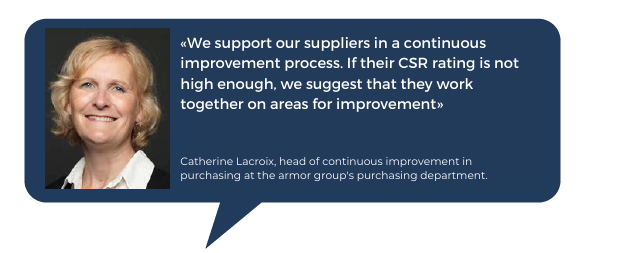the challenges and direct benefits of sustainable procurement

Implementing a responsible purchasing and circular economy policy is not only intended to please the public authorities, it truly commits the company or the community to a desire for change. There are many issues at stake, but they all tend towards the objective of a genuine positive image. A responsible purchasing policy makes it possible to improve one's reputation with :
Improve its reputation
-
Its customers and partners
With respect to individual customers or companies, commercial or non-commercial partners, the reputation of a company is based on a series of aspects. Trust is the first criterion, but taking into account environmental and social issues is nowadays essential.

-
Its (future) employees
The issue of employer branding, in other words everything that a company puts in place around
positive communication of its brand, promotes a good reputation among candidates and
and employees. Even SMEs are concerned by this aspect which contributes to their reputation
with highly sought-after profiles.
Good practice
A. Unite your teams in a common project and improve the company culture
The issue of employer branding, in other words everything that a company puts in place around positive communication of its brand, promotes a good reputation among candidates and employees. Even SMEs are concerned by this aspect, which contributes to their reputation among highly sought-after profiles.
B. Securing supplier relationships and reducing legal and financial risks
The relationship with suppliers is a strategic factor that determines the entire value chain. Both in the selection of suppliers and in the core of the collaborative work, it is necessary to balance the forces involved. In a responsible purchasing policy, suppliers are of course at the centre of expectations. Implementing this approach will require analysing each of them and drawing the consequences in order to either maintain the relationship, or to put an end to it if areas for improvement are not adopted. Responsible engagement of suppliers will promote the security of the relationship and, consequently, reduce risks of any kind (financial, non-quality, compliance with deadlines, personal relationships and conflicts of interest, illegal awarding of gifts, etc.).

C. Innovate and find new business opportunities
The development of a new responsible purchasing policy and its application allow us to win new tenders. This is possible thanks to an excellent reputation and references that foster the confidence of clients and principals.
A sustainable procurement policy is also an opportunity to innovate, i.e. to find new operational and strategic directions based on sustainable development criteria. Suppliers who apply social and eco-responsible production innovate, for example, by seeking more sustainable materials or by integrating a circular life cycle. Sustainable procurement is thus a source of future vision and value creation.
D. Controlling costs
According to the barometer of the Observatoire des Achats Responsables 2021, 84% of companies systematically place the cost of acquisition as the main criterion in their control of expenditure. At the same time, while 55% of them mentioned budgetary constraints preventing them from having a responsible purchasing policy in 2020, only 36% of them did so in 2021.

